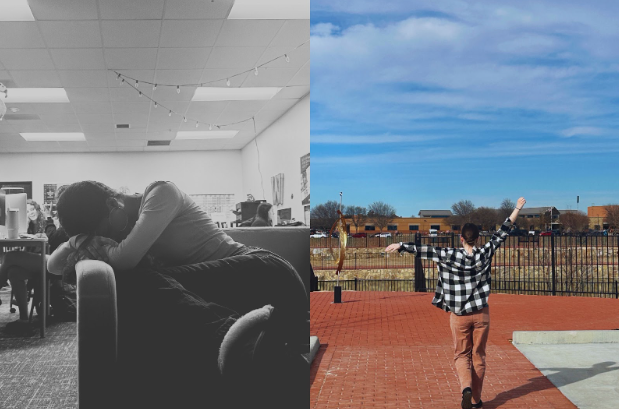As the days get shorter and the air gets colder, the arrival of fall and winter can bring not only a change in weather but also a shift in our mental well-being. For high school students, managing the demands of academics and navigating the complexities of social life can make the seasonal blues feel even more challenging. Especially for upperclassmen, juggling advanced coursework, extracurricular activities, college applications, and social obligations can create a perfect storm for stress. The naturally depressing aspects of fall and winter, due to decreased sunlight and colder weather, can amplify these bad feelings.
Seasonal Affective Disorder (SAD) is a type of depression that occurs during a specific time of the year, most commonly in fall and winter. While anyone can experience a touch of the winter blues, it is important to remember that SAD is more than just feeling down; it’s a real and challenging mental health condition. Mrs. Mckee, the AP Psychology teacher at Wakeland, shares her valuable insight and advice for tackling these seasonal challenges and maintaining mental well-being.
“Really just spending time outside and taking advantage of the sunlight hours can help. It can be beneficial to go outside and take a refreshing break from sitting so much. Set a timer during study sessions to walk outside and get your blood flowing,” Mckee advises.
She also emphasizes the importance of treating yourself with kindness and respect.
“You’ve gotta find the things that make you feel useful and worthy. Sometimes people really believe in self-esteem, but it’s really self-respect,” Mckee said.
In the AP Psychology course, McKee discusses the concept of an internal and external locus of control. Having an internal locus of control, where individuals take responsibility for their successes and failures, is linked to a healthier balance between work and downtime. Setting and achieving personal goals is suggested as a means to find this crucial balance.
“When you have that internal locus of control you can enjoy your downtime and your work time,” Mckee said. “Sometimes making goals like that and following through helps you find your [personal] balance.”
In general, many students would agree that they notice changes in their mood and energy during the fall and winter months. Junior Sruthi Senthil acknowledges feeling a dip in mood and energy during the winter, but she adopts an optimistic perspective.
“During the winter season, I feel my mood and energy is down compared to the summer season. Although, it’s still nice to experience different weather,” Senthil notes. “Personally I don’t usually feel sad, even though the weather has changed. It’s more of the cold weather being hard to endure because I am used to warmer weather. If I ever do feel low, I try my best to ignore it and make the best out of the weather.”
Another junior, Erica Gentry, attributes her winter blues to the time change and academic pressure. She acknowledges the potential impact of seasonal depression on high school students and points out the stigma surrounding their mental health struggles.
“During the winter I notice that I feel more sad. I think it’s the time change and how early it gets dark. School also gets harder, especially because there is nothing to look forward to in the third nine weeks,” Gentry comments. ” I think [seasonal depression] does affect a lot of high school students, and a lot of people don’t take students’ depression seriously because there is a lot of stigma around it.”
To counter these challenges, Gentry recommends staying warm, going out in the sun, and spending quality time with family and friends. Even when the weather is cloudy, there are still ways to benefit from artificial sunlight. Junior Manshi Swain suggests using a sun lamp.
“Get a sun lamp, it imitates the warmth of the sun, and that replication of sunlight can help with your mood,” said Swain.
High school can be overwhelming sometimes, especially with the added problems of Seasonal Affective Disorder. If you’re struggling during the fall and winter, know that SAD might be contributing to it, and learn how to counter the effects. You can also reach out to friends, family, or a trusted adult for support.



